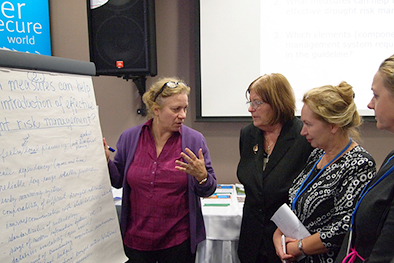Dr. Danka Thalmeinerova is Senior Knowledge Management Officer at the global GWP secretariat in Stockholm, Sweden.
- What would you say are the main challenges in your work as a woman?
Our society has undergone a massive change. These days, women are found in large numbers in professions that used to be typical for men. I am lucky to live in a free society, where discrimination does not exist, in general. During my 25-year or so career, I worked in the public as well as private sector, with a few NGOs as well as teaching at university. I did not observe any different conditions for men or women. It is a true that I tried to select an occupation that would not hamper my family life – this is a typical consideration when women are promoted in their work. That is maybe a reason to why we see less women in CEO positions.
However, I see several challenges that make women’s work more difficult. Take for example a bias that “women are better to take assignments that men do not like to do”. For example, writing the reports/minutes from meetings; arranging logistics for conferences; administering piles of financial papers; making your PowerPoint presentation look good. All these are assignments that require more and additional time. After a meeting, a successful completion of a project or an excellent conference organized, there are usually women still in full speed to “make the last dot”. So, challenges are to manage time and focus on both the content and the form. Another challenge I was faced with was to travel on business trips – in addition to “working hours” on business trips, I am still at “parallel working hours” with the routine office duties and my family, of course.
- What have you done to overcome these obstacles/challenges?
Not much. I think that women are easier to be convinced of “additional” work without extra payment or appreciation. But after this interview, I will start to think and observe some tricks from men. I believe that men and women are like two sides of the same coin. I would not consider that being a women at the workplace is a challenge to be overcome. A proper mixture and diversity is essential for better results in the work and in my organization.
- What has been your drive in your activities?
I enjoy working. Simply as that. There are many cases in the world where this is not possible for women. For example, in some countries in the developing world, less than 5% of women have access to secure land rights and water rights – and these are the most important elements for mitigating poverty. This needs to be studied, analyzed and addressed. Only a few organizations and agencies point out and analyze the link between poverty and poor women rights. Little research has been done to advise governments that equal women’s rights are essential for the development of the whole society.
- Recommendations to other women in similar situations (in the water world)?
Set up priorities, manage your time wisely and enjoy what you are doing.
Prof. dr. Tjaša Griessler Bulc is Head of the Institute for transfer and application of knowledge at the Faculty of Health sciences, University of Ljubljana, Slovenia, where she is lecturing water relating topics. Prof. dr. Tjaša Griessler Bulc has won Lillehammer Award 2001 within the industrial development programme Eureka, the award “Technology of the year 2001”, and in 2008 she and her team were awarded with the Energy Globe Award in the European parliament.
- What would you say are the main challenges in your work as a woman?
I feel that I can more and more use women’s attributes of patience, acceptance of differences, ability of listening and capability to harmonise and encourage, which are nowadays very much appreciated also by men especially since the integration of different disciplines and sectors was recognized as an important factor to increase resilience of water world. So I do not feel so much challenged as a woman, on a contrary I feel even more privileged being a woman in my work.
- What have you done to overcome these obstacles/challenges?
I am trying to soften the barriers between stakeholders, to share my enthusiasm, optimisms to achieve improvement although in small steps, to identify strengths instead of focusing on weaknesses, to enjoy a path instead of a goal, to support ideas that unify and not separate.
- What has been your drive in your activities?
I am fascinated by the nature itself, its circulation, natural balance, and harmony, and I try share and communicate that among my colleagues, project partners etc. I also love simplicity, although I try not to simplify. I also like to share the message that each individual is an important link in the chain of improving the environment.
- Recommendations to other women in similar situations (in the water world)?
The beauty of the water world and human health is that it connects people, because it is a common interest of everybody independently from their economic, cultural or religion background. I think that the wish to harmonise, unify, and bring higher quality of life for everybody is very close to women’s nature, so a water world offers a great opportunity to do so. However, I recommend to other women to focus as much as possible on such activities that bring them joy and happiness and have the courage and flexibility to distant themselves from those which make them tired, exhausted and unappreciated.
